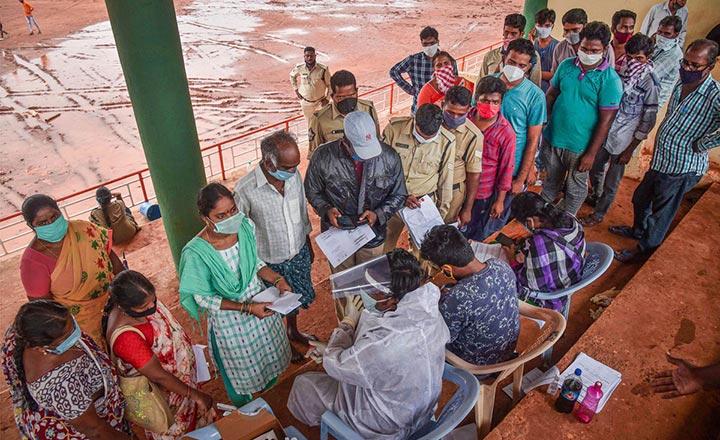Pre COVID era, in Indian households, dry cough was dealt with frequent warm salt water gargles. A mild fever meant swallowing a paracetamol tablet after dinner and going to sleep. And, headaches vanished after aggressively massaging your forehead with an analgesic balm. But, times are different now. If you have these symptoms today, you are immediately on your guard. The first thing that crosses your mind, “Do I have coronavirus? Should I get tested?” Understandably, in the fight against COVID-19, everyone wants to be on the front foot. However, you cannot simply walk in to a testing centre and get tested to rid yourself of all doubts.
Here’s why: According to the guidelines set by Indian Council of Medical Research (ICMR), laboratory test will only be offered when prescribed by a qualified physician. As of July 16, ICMR had approved 1,244 laboratories for COVID-19 testing. Of these, 880 are government laboratories that conduct tests for free and 364 are in the private sector. In March, the medical body had put a price cap of Rs.4,500 for RT-PCR test, which is considered the gold standard for confirmatory tests, in private labs. In a later advisory, ICMR asked the states to “fix mutually agreeable prices”, following which several states halved the prices to around Rs.2,500. However, if you are willing to bear the cost but you don’t have a qualified doctor’s prescription, authorised laboratories will not entertain you.
Now, in the pursuit of getting a doctor’s prescription, one might lose several precious days. A Facebook user by the name Amrin Talib shared in a post that she was denied prescription for COVID test by five doctors. By then, her condition had worsened and her mother, too, had developed some symptoms. In a country of 1.3 billion people, many such stories will emerge if the guidelines aren’t changed. While several experts are of the view that doing away with the mandatory prescription requirement will lead to people depleting resources, others counter this by saying that it should be the government’s prerogative to let anyone get tested anywhere by ramping up manufacturing of testing equipment and setting up infrastructure.
In late June, ICMR allowed rapid antigen detection and IgG antibody tests as two new strategies to improve the accessibility and availability of testing in various parts of the country. However, SD Biosensor’s Standard Q COVID-19 Ag detection assay is the standalone antigen detection test which is available in India and has been validated. Other manufacturers of antigen-based tests have been encouraged to approach ICMR for validation. So, it will obviously take some time before antigen-based tests can scale up rapidly across the country. As for antibody-based testing, ICMR failed to mention the laboratories eligible to perform them. To add to people’s woes, a price cap has also not been fixed and private labs are reportedly charging anything between Rs.500 and Rs.1,900 per test.
Meanwhile, on July 7, Brihanmumbai Municipal Corporation (BMC) allowed testing for all, irrespective of whether they have symptoms or not, and without a doctor’s prescription. Now, if states are allowed to take such steps, then why haven't others done it yet? Currently, India is conducting around 300,000 tests per day, and experts believe this number has to go over a million for a country with such a large population. As of July 16, a little over 13 million samples have been tested for COVID-19, which is only 1% of India’s population. Amid the entire process being clouded with doubts, labs looking to make a quick buck and WHO confirming airborne transmission of COVID-19, India’s fight with novel coronavirus seems to be just beginning.
Where’s my test?
With restrictions in COVID-19 testing and vague ICMR guidelines, is India really fighting novel coronavirus with all guns blazing?

Opening
Opening








